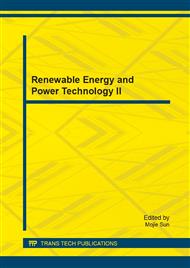p.485
p.489
p.493
p.499
p.503
p.509
p.518
p.522
p.529
Cost-Benefit Analysis Model of Single and Hybrid Energy Storage System in Active Distribution Network
Abstract:
The active distribution network is an effective approach to solve the problem such as the high penetration of intermittent renewable energy. This paper constructs single and hybrid energy storage battery systems in the active distribution network, calculates the economic benefits of the single and hybrid energy storage systems from six aspects in annual electricity sale revenue, ancillary revenue, investment cost, maintenance cost, landed cost and power shortage punishment cost. Take the lithium iron phosphate battery as single system, the lithium iron phosphate battery and Lithium titanate battery as the hybrid system to compute the cost benefit. The results show that the storage systems have effects to the intermittent renewable energy in peak shaving. Since the hybrid energy storage system can obtain more annual ancillary revenue, and the batteries’ work life is longer, it has more advantage in economic benefits than the single energy storage system.
Info:
Periodical:
Pages:
503-508
Citation:
Online since:
October 2014
Authors:
Price:
Сopyright:
© 2014 Trans Tech Publications Ltd. All Rights Reserved
Share:
Citation:


